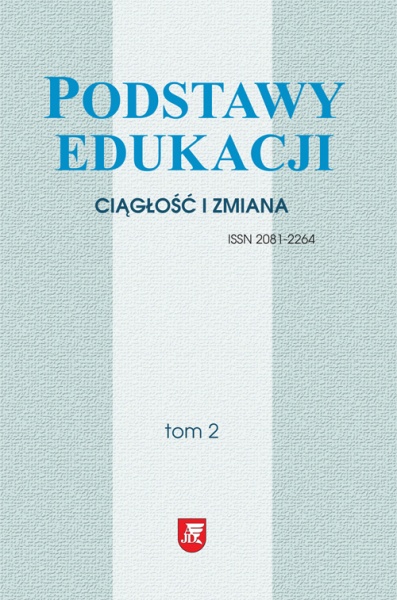Abstrakt
Rzeczywistość społeczna, w tym także edukacyjna, trwa dopóty, dopóki toczą się w niej określone procesy i zachodzą przekształcenia. Jest w nieustannym ruchu i nie sposób ją uchwycić w postaci zastygłej, niezmiennej. Wszystko, co w niej trwa, trwa tylko dzięki temu, że jest systematycznie odnawiane przez ludzkie działania w strumieniu życia zbiorowego. Zmiany obserwowane na płaszczyźnie edukacyjnej są formą procesu edukacyjnego, przyczyniającego się nie tylko do tworzenia teoretycznych i praktycznych ujęć pedagogicznych, ale polegającego także na pojawianiu się, znikaniu lub restrukturyzowaniu dotychczas istniejących komponentów rzeczywistości edukacyjnej, a więc struktur, organizacji i instytucji edukacyjnych oraz „porządku edukacyjnego”, np. przyjętego sposobu zachowania się nauczyciela i ucznia, czy też określonego ładu i stylu nauczania. Zarówno współczesny postęp społeczny, jak i ponowoczesne zmiany kultury powodują przekształcenia w dotychczasowym systemie wartości, zasad i norm edukacyjnych. Teorie pedagogiczne wymagają wobec tego otwarcia na nieznane oraz zastosowania technik adaptacji, które pozwolą na dostosowanie ich do zmieniających się reguł i będą sprzyjać trwałym lub nietrwałym, jawnym lub ukrytym, świadomym bądź nieświadomym przeobrażeniom rzeczywistości edukacyjnej. Niniejszy artykuł jest próbą refl eksji nad obrazem ponowoczesnego pedagoga, jaki pojawił się w wyniku zastosowania postmodernistycznych koncepcji. Podstawą analiz są zmiany od fordyzmu do postfordyzmu oraz od modernizmu do postmodernizmu, które skutkują przemianami w obrębie pedagogiki.
Bibliografia
Bauman, Z. (1994). Dwa szkice o moralności ponowoczesnej. Warszawa.
Bauman, Z. (1999). Po co komu teoria zmiany. W: J. Kurczewska (red). Zmiana społeczna: teorie i doświadczenia polskie. Warszawa.
Giddens, A. (2004). Socjologia. A. Szulżycka (tłum.). Warszawa.
Goodman, N. (1992). Wstęp do socjologii. J. Polak, J. Ruszkowski, U. Zielińska (tłum.). Poznań.
Krzysztofek, K., Szczepański, M. S. (2002). Zrozumieć rozwój od społeczeństw tradycyjnych do informacyjnych: podręcznik socjologii rozwoju społecznego dla studentów socjologii, nauk politycznych i ekonomii. Katowice.
Kuleta, M. (2002). Człowiek jako kreator zmian w swoim życiu. W: D. Kubacka-Jasiecka (red.). Człowiek wobec zmiany. Rozważania psychologiczne. Kraków.
Matuszek, K. (2002). Zmienność i ciągłość w perspektywie teorii socjologicznych. http://www.zmiana.pl (4.03.2007).
Niedźwiedzki, D. (2003). Władza – tożsamość – zmiana społeczna. Kraków.
Rybicki, P. (1979). Struktura społecznego świata: studia z teorii społecznej. Warszawa.
Szkudlarek, T. (1993). Wiedza i wolność w pedagogice amerykańskiego postmodernizmu. Kraków.
Szkudlarek, T. (1995). Edukacja w wieloznaczności: perspektywa postmodernistyczna. W: J. Rutkowiak (red.). Odmiany myślenia o edukacji. Kraków.
Sztompka, P. (1999). Stawanie się społeczeństwa: pomiędzy strukturą a zmianą. W: J. Kurczewska (red.). Zmiana społeczna. Teorie i doświadczenia polskie. Warszawa.
Śliwierski, B. (2003). Współczesne teorie i nurty wychowania. Kraków.
Turner, J. H. (2004). Socjologia: koncepcje i ich zastosowanie. E. Różalska (tłum.). Poznań.
Turos, L. (red.) (1999). Pedagogika ogólna. W: L. Turos (red.). Pedagogika ogólna i subdyscypliny. Warszawa.
OŚWIADCZENIE AUTORA:
Mam świadomość, że czasopismo jest wydawane na licencji Creative Commons - Uznanie autorstwa (https://creativecommons.org/licenses/by/4.0/legalcode).
Przesyłając artykuł wyrażam zgodę na jego udostępnienie na tej licencji.
